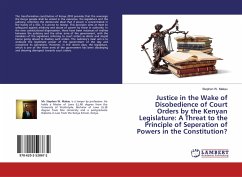
The Right of Revolution
Revolution - Resistance - Disobedience
Versandkostenfrei!
Versandfertig in 6-10 Tagen
34,99 €
inkl. MwSt.

PAYBACK Punkte
17 °P sammeln!
The right of revolution derived from the constitutional texts of the 18th century, which came to the surface after the breakthrough of the American and French revolutions. As a result, the right of revolution rapidly related to the general constitutionalism and the theory of the human rights. After the World War II, apart from the constitutional law, the international law, directly and indirectly, recognized the right of revolution under the prism of the UN Charter, the Geneva Conventions of 1949, the Jus Cogens theory, the general principles of law, the customary international law and the rig...
The right of revolution derived from the constitutional texts of the 18th century, which came to the surface after the breakthrough of the American and French revolutions. As a result, the right of revolution rapidly related to the general constitutionalism and the theory of the human rights. After the World War II, apart from the constitutional law, the international law, directly and indirectly, recognized the right of revolution under the prism of the UN Charter, the Geneva Conventions of 1949, the Jus Cogens theory, the general principles of law, the customary international law and the right of self-determination. Although disobedience and resistance are mainly illegal acts, a revolution is a lawful act which can even change the fundamental charter of a state, such as a constitution. Revolution is a political right, which typically belongs to the first-generation of human rights and it is exercised only collectively.












